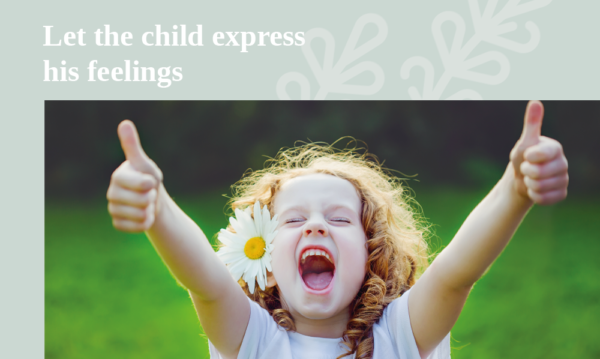The ability to cry, laugh, and verbally express our feelings and thoughts is exclusively human. The expression of our emotions and ideas helps us to communicate them accurately to those around us, ensuring our emotional balance and harmony in our daily lives. Children express themselves not only to ensure their emotional balance but primarily to develop spiritually and socially.
When children feel unable or afraid to express their feelings, they accumulate until they bring them into a state of despair; this inevitably leads to physical, behavioral, and developmental problems, such as aggression, depression, tics, compulsions, and learning difficulties, sleep disorders and more.
When a child manifests pain, anger, jealousy, loneliness, frustration, or sadness, we tend to suppress his feelings’ healthy manifestation in these ways. The tendency to constantly look for ways to correct the “disturbing” behavior – the child’s condition (anger, jealousy, sadness), can distract us from the child’s real need to let his feelings break out.
Although it is good to avoid dramatizing and intensifying the child’s reaction, we can hear it calmly and understandingly. Then, the child finds that he can control his emotions.
When we listen carefully to everything a child has to say, his ability to recover from ordinary intense emotional experiences improves. Maybe he needs to have a small or a furious outburst.
In any case, when he is free to show his feelings in a safe environment with loving parents or adults, one moment he can rage and cry, while after the intervention of the parents to play as if nothing has happened. As long as we do not suppress his emotions, preventing their expression, or adding our reactions, the child assembles quickly.
If a child insists on expressing his agitation, although you hear it encouragingly, perhaps this is because this particular incident recalled other, earlier painful incidents that were not heard enough when they occurred.
Avoid “dictating” feelings to your child. You expect him to react to what’s happening to him. Trust your child. If he needs to express an emotion, he will. If not, he won’t express it. You don’t have to decide whether or not to provoke any feelings.
Most of the time, children express briefly their feelings and thoughts about annoying or not situations and recover. What prolongs the process is our attempt to either block them or dramatize the condition. When parents raise their concerns, the child reflects those feelings written by the drama. As soon as parents learn to let nerves or grief break out freely, they observe with admiration how quickly their child recovers.
The child experiencing our calm presence will conclude that strong emotions are part of human nature. Feeling comfortable with his feelings, he acquires a sense of inner peace since he realizes that he does not have to fear the challenges and emotions that may accompany them.
Often, our haste to distract the child from pain or despair, comfort him for frustration, or minimize the importance of his misfortune, is a reaction to our own anxiety not to let the child be sad and not a reaction to the child’s stress.
When children are not afraid to express themselves, they can accept emotions as a part of human existence. If we do not present painful feelings as problematic or unwanted, children conclude that these experiences are in life and that they do not need to fear and avoid the emotions they experience but to understand and use them for the benefit of their personal development.
Literature:
Arnold, N., (2010). Raising our children, raising ourselves.


